The COVID-19 pandemic has hugely affected Muslims across the globe, not only affecting health but also forcing them to cancel Jumu’ah and congregational prayers and close mosques.
With many yearning to the weekly Friday prayer and mosque gatherings, questions have been raised on whether Muslims can hold virtual/online community gatherings for prayer due to the global pandemic.
In this regard, Sheikh Ahmad Kutty, a senior lecturer and an Islamic scholar at the Islamic Institute of Toronto, Canada, told AboutIslam.net that this unprecedented situation calls for an exceptional ruling.
The renowned scholar referred to instants in the Islamic history where interpretation of texts varied according to time and place.
“Jumu`ah, as stated by Imam Shah Waliullah and others, is a crucial Shi’ar or symbol of Islam, the purpose of which is to demonstrate the community spirit, unity, and strength,” Sheikh Kutty said.
“I venture to say that it can be done – but only as a temporary measure. Only as a temporary measure because, otherwise, it will lead the way to the great harm of shutting down mosques.
? Read the full Article of Sheikh Kutty:
COVID-19: Holding Virtual Jumu`ahs and Taraweeh Prayers
Stressing on the temporary nature of this ruling, Sheikh Kutty also mentioned steps to follow:
“A virtual Jumu’ah can be instituted as a temporary measure by each Jami (congregational mosque) serving its congregants. A safe and reliable method of the Khutbah and prayer should be in place to make it easy for the congregants to listen to the Khutbah and follow the Imam in prayer from their homes or workplaces,” he said.
He then reiterated, “This practice must stop as soon as the lockdown situation and the ban of closing down places of the gathering are lifted.”

Different Opinion
On the other hand, other scholars had a different opinion on the ruling of virtual or online Jumu`ah prayer.
Dr. Jasser Auda has a fatwa that individual families could pray Jumu`ah at home if they meet the conditions of establishing Jumaa. He also agreed with Sheikh Kutty only if the followers of the Imam are in the vicinity of the mosque and not dispersed around the city.
On the other hand, a statement by the North American Fiqh Council, as prepared by Dr. Yasir Qadhi, said, “The khutbah (Friday sermon) that is being broadcast, even if live, does not take the ruling of a Friday sermon for those who listen to it from their houses.”
The ruling cited a unanimous consensus amongst all the schools of thought that an unreasonable gap in between the lines breaks a congregational prayer. Therefore, there is no jama`ah with many households praying many miles apart.
The Resident Fatwa Committee of the Assembly of Muslim Jurists of America (AMJA), has a similar opinion.
“It is not permissible according to any valid madhhab for the gap between the rows to be miles long, with tens of buildings and roads as dividers between them,” AMJA wrote.
Online Taraweeh?
As Ramadan approaches, Sheikh Kutty also stressed that the same ruling of Jumu`ah prayer applies to Taraweeh prayers.
“If the lockdown is not lifted in time for Ramadan (as it appears to not be), then we should also hold virtual Taraweeh in the same way as mentioned above, i.e. each congregation following their own Qari and Imam,” he said.
“In the case of Taraweeh, it should be a lesser issue as it is a Nafl (optional) prayer, with the soul of Taraweeh being listening to the Quran.”
Similar questions have come out regarding fasting the holy month of Ramadan and whether Muslims are allowed to break their fast during the pandemic or no.
However, Al-Azhar Fatwa Global Center said in an online fatwa that it is not permissible for a Muslim to break his fasting unless doctors decide, and it is scientifically proven, that fasting would make him vulnerable to infection and death by the coronavirus.
But the fatwa has also made it clear that medical experts have not decided yet on the issue. So, there’s no need now to cause such panic or stress.
